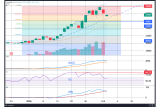
As Japan stands amidst global upheavals, offering a haven from the tumultuous winds sweeping through other regions, shipowners invested in maritime trade are being forced to carefully navigate the implications of the unique geopolitical landscape.
Amidst chaos in the Middle East, conflict in Europe, and internal strife in America, Japan has emerged as a serene refuge. Its allure as a sanctuary has not gone unnoticed by notable figures like Jack Ma and Roman Abramovich, who have sought solace in its shores. Beyond the realm of billionaires, Japan is experiencing a surge in tourism, driven by a volatile and weakened yen.
This newfound interest in Japan extends to investors as well. With Warren Buffett’s visit seen as an endorsement and the Nikkei share index surging, optimism is brewing about Japan’s economic resurgence after decades of stagnation. The juxtaposition of Japan’s economic slowdown with China’s meteoric rise over the past 30 years is stark, yet shifting tides of concern over China’s future trajectory are redirecting attention back to Japan. Western firms are bolstering their investments in Japan, drawn by its stability and reliability amidst uncertainties surrounding China.
However, Japan’s demographic challenges, including a shrinking and aging population coupled with low immigration rates, pose hurdles in maintaining its economic momentum. Yet, Japan’s technological prowess, robust industrial base, and substantial savings serve as pillars of strength. As exemplified by TSMC’s investment in semiconductor manufacturing facilities, Japan aims to revitalize its industries and secure a prominent role in global supply chains, independent of mainland China.
Despite the allure of Japan as a haven, concerns linger about the future of its relationship with China. While anxiety over China’s economic prospects benefits Japanese service industries and real estate markets, the intertwined nature of their economies presents risks. Japanese companies rely heavily on the Chinese market, and any decoupling efforts could disrupt established supply chains and impact sales.
The concept of “friendshoring,” championed by the United States, offers potential opportunities for Japan to strengthen ties with like-minded democracies and diversify its trade partnerships. However, the unpredictability of American policies, especially considering potential political shifts, adds a layer of uncertainty. The specter of a return of a protectionist and unpredictable administration in the US looms large, exacerbating concerns in Tokyo.
Moreover, Japan faces security challenges in its proximity to China, Russia and North Korea. Heightened military tensions, territorial disputes, and the specter of an increasingly assertive Chinese navy contribute to the sense of unease. Tokyo’s response involves ramping up defense spending and deepening ties with the United States to counter these threats.
In the midst of these complexities, the transient nature of Japan’s haven status is akin to the fleeting beauty of cherry blossoms that has just passed. While it offers respite from the world’s troubles, this sanctuary may not endure indefinitely. Shipowners, engaged in global maritime trade, must navigate this delicate balance, considering market volatility, diversification of trade routes, economic shifts, security concerns, regulatory changes, and long-term strategic planning.
In essence, success in the maritime shipping business amidst Japan’s haven status requires a nuanced understanding of geopolitical dynamics, proactive risk management and strategic foresight to capitalize on emerging opportunities while weathering potential storms on the horizon.
By Eugene Quek, Partner & Head of Projects in Japan.
Articles
You may also be
interested in
View allGet in touch
Contact us today to find out how our expert team can support your business
















